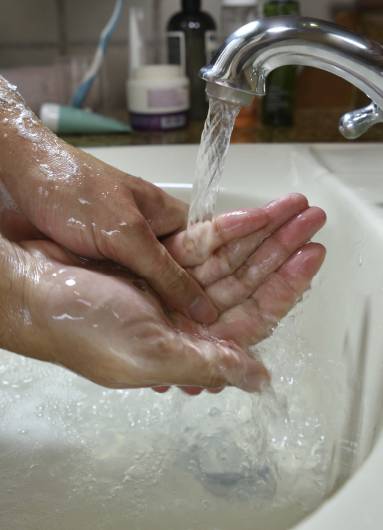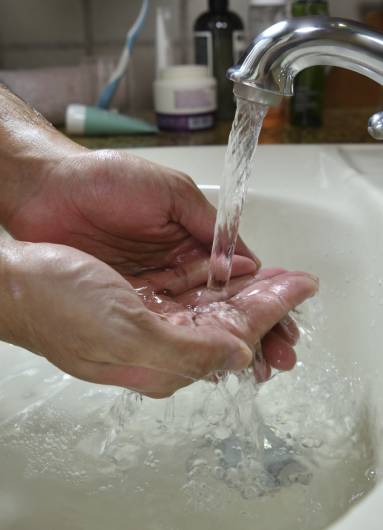As one of main climate change hotspots, the Mediterranean region already has over 180 million people who are water poor. While today, 3 out of 4 jobs are water-dependent.

UfM Water Agenda
Context and Objectives
Joining forces to address the challenge of water security is therefore of utmost importance, not just as a means of allowing economic growth to flourish, but also to safeguard greater stability for communities and tackle one of the
root causes of migration. Put simply, progress towards the Sustainable Development Goals will always be hampered without first securing this fundamental human right for all.

The Union for the Mediterranean has prioritised leading the development of a regional Water Agenda to address this precise problem and ensure access to safe drinking water as a basic need on which sustainable development depends. The UfM Water Agenda, comprise its Policy Framework for Actions 2030 and a financial strategy for implementation.
The UfM Water Agenda was put together in consultation with UfM Member States in order to guarantee it responds to the needs of all countries. It sets out a series of technical and financial recommendations, which aim to ensure that each country receives the necessary technical, administrative, and financial advice to help it achieve water security for its populations and their economic activities.
A Financial Strategy for Water was also drawn up to accompany. The Financial Strategy aims to facilitate investment in the fields of access to water; protection against droughts, floods and water pollution; and sustainable growth in the Mediterranean region, while enhancing the financial sustainability of the water sector. It will do so by raising the profile of the issue within the finance community, providing analytical work on how to overcome barriers to investment, and promoting impactful, new ways of financing water-related investments.
The Water Policy Framework Of Actions from the Partners Perspective
Timeline of the UfM Water Agenda
December, Jordan – The Euro-Mediterranean Ministerial Conference on Water mandates the creation of the UfM Water Expert Group.
April, Malta – UfM Ministers of Water gather to call for the development of a Water Agenda and Financial Strategy – the UfM Ministerial declaration on Water (Malta, 2017).
February, Jordan – The Water Expert Group creates the Water Financing Task Force to develop the Financial Strategy.
April, July and September – The Water Financing Task Force meet three times to discuss the Financial Strategy.
November, Greece – The draft Financial Strategy is discussed by the Water Expert Group.
December, Spain – The Financial Strategy is adopted at the Senior Officials Meeting.
Jordan and Albania – UfM National
Workshops on Sustainable Water Financing take place to help Member States implement the Water Agenda’s Financial Strategy.
UfM Water Partners Meeting – December 2020.

September 2021, Science advance – Cyprus.
Water Forum – Malta + WWC.

Expert Group and Policy Framework
The UfM Water Expert Group (WEG) provides a platform for information sharing and the promotion of common objectives related to water. The WEG put together the Water Agenda: its policy framework for Actions with its
Financial Strategy based around four chapters. Each chapter will suggest best practices, trainnings, types of interventions, implementation plan and partnership proposal.
Water-Energy-Food-Ecosystem (WEFE) Nexus
The nexus concept recognises that water, energy, food, and ecosystems are all intertwined, and can both negatively and positively affect one another. For example, healthy ecosystems support the sustainability of food, water, and energy, and are negatively affected if these are used in an unsustainable way. Recommendations made within the WEFE Nexus therefore aim to enhance water, energy and food security while preserving ecosystems.
Water-Employment-Migration (WEM) Nexus
Water, employment and migration also have effects on one another. For example, many employment-generating economic sectors are heavily dependent on water. Water-related challenges are therefore projected to lower the MENA-regions GDP by 6-14% by 2050. The resulting loss of employment is a catalyst for migration, which in turn puts pressure on food and water supply in transit countries. The WEM Nexus therefore aims to tackle water challenges as one of the root causes of unemployment leading to migration, also taking into account the impact of migration on water resources. Recommendations also aim to boost water-related entrepreneurship, increasing access to finance and creating an environment for sustainable development.
Water and youth opportunities in the Mediterranean – Gap Analysis and Survey Results
Water Supply, Sanitation, and Hygiene (WASH) Nexus
United Nations Sustainable Development Goal 6 is to ensure access to water and sanitation for all. The UfM Water Agenda is an instrument to help member states achieve this goal. The UfM also acts as a platform for member states to build capacities and exchange knowledge in order to enhance the sustainable use of water resources.
The water and Public health Nexus- WASH response to COVID19.
Water and Climate Change Adaptation (WCCA) Nexus
The impacts of climate change are exacerbating pressures on existing water resources, in particular in the The impacts of climate change are exacerbating pressures on existing water resources, in particular in the Mediterranean region. The WCCA Nexus is considered horizonal and spans the other thematic areas, since climate change affects all of them. Potential lines of action to be developed include:
- Adaptation and mitigation measures
- Desalination and wastewater reuse
- Groundwater recharge
- Storm water harvesting
- Use of renewable energy in groundwater abstraction

The Ministerial Declaration on Water (Malta, April 2017) mandated the UfM Water Expert Group to develop a Water Agenda and associated Financial Strategy. The Water Agenda,
entitled Water Policy framework for Actions 2030 was endorsed at the Senior Officials Meeting in December 2018 and its implementation has been ongoing since then.
Key partners
European Commission
Global Water Partnership-Mediterranean (GWP-Med)
German Corporation for International Cooperation GmbH (GIZ)
United Nations Economic Commission for Europe (UNECE)
Food and Agricultural Organization of the United Nations (FAO)
Partnership for Research and Innovation in the Mediterranean Area (PRIMA)
UN Environment Programme (ENEP)
Global Environment Facility (GEF)
Swedish International Development Cooperation Agency (Sida)
MAVA Foundation
UNESCO World Water Assessment Programme (UNESCO- WWAP)
International Centre for Advanced Mediterranean Agronomic Studies (CIHEAM)
Anna Lindh Foundation





Response to COVID
The provision of safe water and sanitation is essential for protecting human health during the COVID-19 outbreak. Hand washing in households increased from 9 to 12 litters per person per day as a result of the pandemic mitigation measures, which represents an average increase of 5% in the demand for water for domestic use.
Water and sanitation providers are under increased pressure to continue providing safely managed water and sanitation services, with increased demand for equipment, restricted movement of personnel, and reduced recovery costs. To help coordinate a region-wide response to the pandemic, the UfM organised several initiatives:
- A consultation with over 100 experts from 21 countries, which emphasised that relief and recovery efforts.
- A series of virtual working sessions with the Mediterranean Water Institute on the effects of COVID-19 on water and sanitation. Experts from 12 countries exchanged best practices and the emergency plans being prepared in their countries.
- Following the discovery of traces of COVID-19 in wastewater treatment plants, the UfM is working with the European Commission’s Joint Research Centre to host a webinar showcasing guidelines and tools for keeping such infrastructure safe.
- The UfM is launching a study on the impact of COVID-19 on the water sector, as well as supporting recovery strategies by providing a platform for policy dialogue and up-scaling of successful projects.


